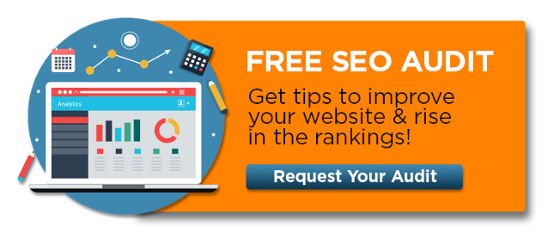Let's face it: SEO marketing is complex. Thousands of small businesses like you are trying to figure out why they’re not showing up in Google search results. After all, everyone wants to rank on the first page of Google.
Meanwhile, Google is like a schizophrenic zookeeper. Between Panda, Penguin, Pigeon, Hummingbird and more, they're constantly changing their algorithms. Over 200 different factors affect search rankings, and it's not getting any simpler.
So why can’t you find your site on Google? When your website isn’t showing up in searches, it can be hard to know where to start. Thankfully, most issues are easy to identify, and an experienced SEO company can help you optimize your website to improve your rankings.
Let's take a look at a few of the top reasons why you might not be ranking on Google.
1. Google hasn't indexed your web design
Search engines organize information from billions of websites into a searchable library, called an Index. They do this with software called web crawlers. Crawlers look at your website, follow the links on your pages and report that information back to Google.
Most of the time, this isn't a problem. Google's crawlers constantly look for new websites and updates, so your site should be indexed automatically within a few weeks. But if the crawlers do have trouble, it's a BIG problem. If you're not in Google's Index, you won't show up in any search results.
Check if your website design is indexed:
In a Google search, type site:yourwebsite.com (without the www, https, etc.)

You should see a list of all your site's webpages. If so, your site is indexed and you have nothing to worry about.
If not, you probably have a new website and Google just hasn't found it yet. You can speed up the process by telling Google about it and submitting your sitemap through Google Search Console.
The search console will also show you if there are crawling errors that are affecting your site.
2. Lack of quality content
Although Google's exact algorithm is a mystery, they have revealed that content is one of their top ranking factors. And not just any content, but high-quality content.
Google rewards only the best content at the top of their search rankings. So if you can’t find your business on Google, chances are you have thin, hard-to-read, or even duplicate content.
Here are a few ways to judge if you’re creating “quality” content:
Relevance:
It may seem backward, but Google wants you to write content for people, not for search engines. Once upon a time, optimized content meant stuffing as many keywords into your copy as possible. Now, Google’s algorithms are rewarding content that is valuable to the audience.
The result is the rise of semantic search, which is a fancy term that boils down to relevance. Semantic search seeks to provide better search results by factoring in search intent, content, and natural language.
For example, when we search for "apple," Google returns Apple's corporate website and local results for the Apple store and the local Dutch Apple Dinner theater. We haven't given Google much context to go on, so it's providing the most popular results in our area.
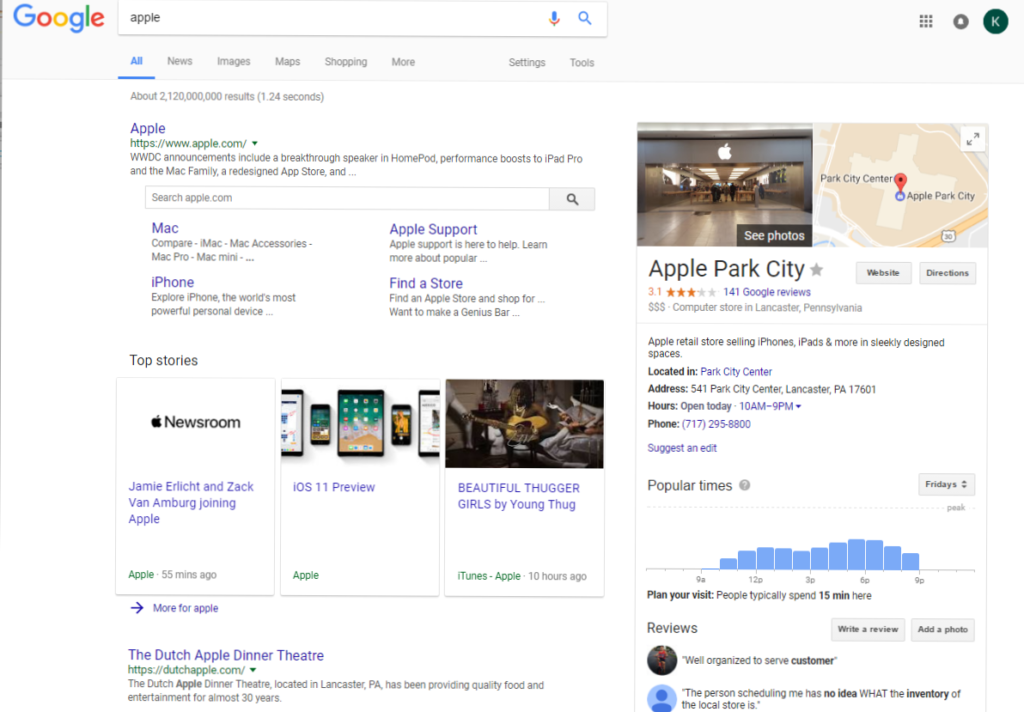
However, if we search for "types of apple," Google knows we're probably looking for information on the fruit, not the company. The top-ranked result is highly relevant to the search and gives a comprehensive list of different types of apples, what they look like, their history and how they taste.
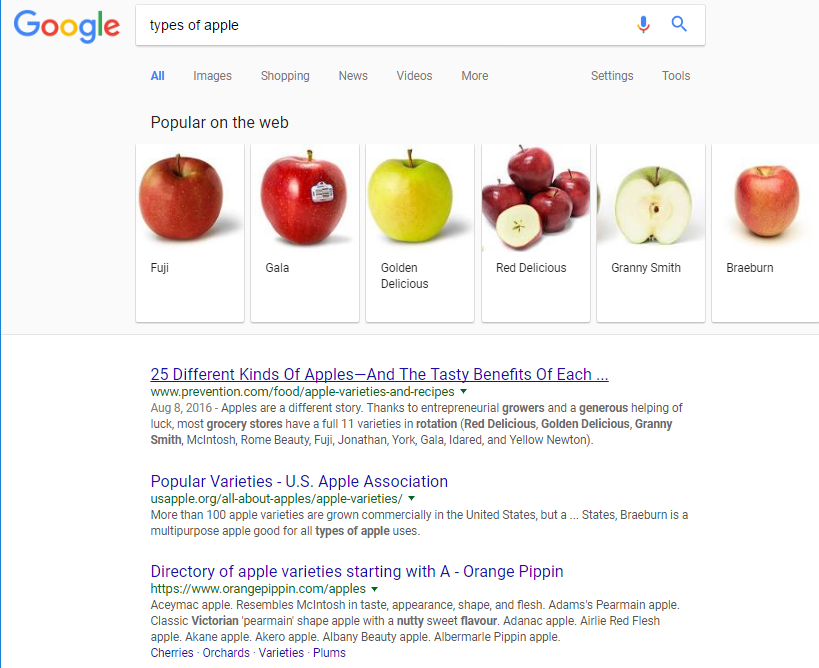
Length:
We're constantly told that people today have short attention spans. While that may typically be true, it's not the whole story.
If you're writing sales copy on your website's product page, you probably don't want paragraph after paragraph of text. People want to understand the benefits of your product quickly. Talking about yourself for too long is boring.
If you're creating relevant educational content, however, longer is often better.
It makes sense, if you think about it. When people are searching for information, a longer, more in-depth page is more likely to have all the answers in one place, versus a short page with only a couple hundred words.
There's no definite rule for how long your content should be. Most sources suggest at least 300 words, but even 2,000-3,000 words for long-form content is perfectly reasonable. According to a recent study, the average Google first page result contains 1,890 words.
Readability:
While readability isn't a direct ranking factor, it does impact a user's experience on your site. Your visitors aren't going to stick around if your site is full of horribly written copy and technical jargon.
Make your content easy to read. Aim for an 8th-grade reading level, in general. While you may have some pieces of content that are more complicated (and some that are easier!), that will keep your content accessible for most people.
3. Lack of quality backlinks
Backlinks are, like they sound, links back to your website from another site. Google uses backlinks as a top ranking factor, because they help measure whether your website is trustworthy and reliable. The idea is that if your site has great content, other people will want to share it, creating backlinks.
What are "quality" backlinks?
Google doesn't just look at how many backlinks you have, they also look at the variety and authority of the sites linking to you. Think about backlinks like a recommendation for your website. Obviously the more recommendations, the better. But if you get recommended by someone from the New York Times, that will carry more weight than a recommendation from some random guy's blog.
You also want backlinks from a variety of sites. Otherwise, it's like your site is getting recommendations from the same handful of people over and over again. It seems spammy and untrustworthy. Unfortunately, there are still black-hat SEO companies who will promise you 1,000's of backlinks overnight, but all they're delivering is these spammy, low-quality links.
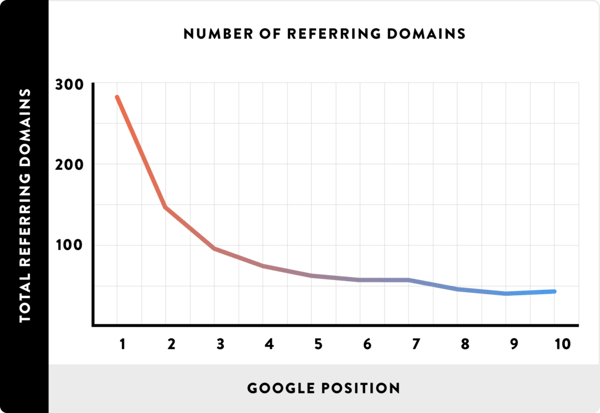
Check your site's backlinks with tools like Moz's Open Site Explorer. The free tool will give you some reports to get started, but we'd be happy to run more detailed reports for you and sit down to review!
4. Your website isn't mobile-friendly
We've written many other blog posts about the importance of a mobile-friendly or responsive web design, but it bears repeating: with over half of all search traffic coming from mobile devices, mobile is here to stay.
Google penalizes sites that aren't mobile-friendly. Not sure if your site is up to snuff? Check it with Google's free tool.
When it comes to being mobile-friendly, page speed also plays a big role. Users generally won't wait longer than a few seconds for a page to load, and mobile users often have slower cellular connections versus a desktop user.
Lastly, take a look at any pop-ups on your website. As of January 2017, Google started penalizing intrusive pop-ups on mobile devices that cover too much of the content, or are hard to get rid of. So far, we haven't seen much impact from the change, but Google can increase the penalty at any time.
5. Your site content isn't optimized
Writing for real people is the top priority for SEO marketing, but that doesn't mean that things like keywords aren't important. On-page optimization can still go a long way toward improving your search ranking. Again, there are a ton of different things you can do, but here are a few simple places to start:
- Title tags & meta descriptions: This is the headline and preview text that appears on a search engine results page. Keep titles to 50-60 characters and descriptions to less than 160 characters in length to make sure they don't get cut off.

- URL structure: Keep URLs simple so users understand how your site is organized and know what information to expect on the page.
- Image alt text: Google's crawlers can read text, but they can't read images, unless you tell them what's there. Use alt text to provide a description of what's in the image so Google can better index the page.
- Include relevant keywords: Keep it natural. You don't want to stuff in keywords and make your content hard to read (Google won't appreciate that). You do want to make sure that you're frequently using keywords and phrases that relate to your subject matter.
Not sure if your on-page SEO is bad? Moz offers a ton of tools for a free 30-day trial, or you can contact us for a free SEO audit!
6. You're not set up for local search
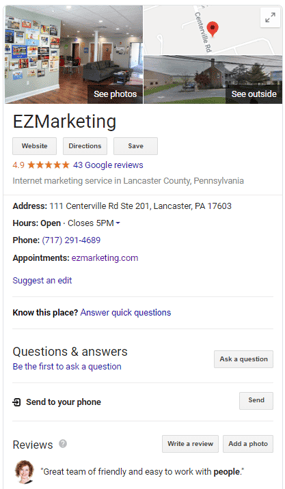
When you Google your business name, you want to see your local business listing pop up on Search and Maps. This involves optimizing your online presence with Local SEO marketing.
The first thing you need to do is create a Google My Business listing. Make sure that you fill in all your information, like your physical address, phone numbers, categories and hours.
Next, you want to make sure that your Name, Address and Phone Number (NAP) are consistent, everywhere they occur online. There are many directories and sites across the web that list business info, and Google checks those directories to verify your business info. If there are variations in your NAP across these sites, Google isn't sure what to trust, and they are less likely to show your business in local search results.
How accurate are your directory listings? Scan your site now with our easy, free tool.
7. You've been hit with a manual penalty
Google manually penalizes websites when they detect sneaky or spammy behavior. This is different from Google's search algorithm, which may rank you lower based on the SEO factors we talked about above.
For legitimate businesses, manual penalties are rare. Google is only trying to stop spammers and people trying to trick the system through bad behaviors like buying links, cloaking content, keyword stuffing, etc.
Still, if your site has been doing well in search and you see a sudden drop in rank, this could be a reason. You can check for any manual penalties against your site in Google's Search Console.
Next Steps...
If you would like to learn more about SEO marketing and your ranking on Google, we'd love to help. SEO is complicated, but we have a whole team of SEO experts dedicated to helping businesses understand and improve their search rankings. We'll analyze your site and run detailed reports that we'll review with you, so you know what you're doing well and where you can improve. Contact our SEO company for a free SEO audit report!
